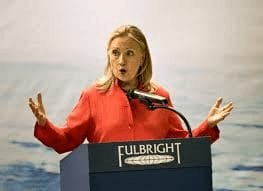Hillary Clinton’s name vanishes from State Department fellowship – By Carole Morello (The Washington Post) / March 20 2018

WASHINGTON – The State Department has dropped Hillary Clinton’s name from a fellowship that sends Americans abroad to work in foreign government ministries.
The Fulbright-Clinton Public Policy Fellowship, around since 2012, is now known simply as the Fulbright Public Policy Fellowship.
A State Department spokesman said the decision to remove Clinton’s name was made last spring as part of an effort to strengthen the Fulbright “brand” affecting a handful of fellowships that award a small number of grants. The Fulbright-Clinton Fellowship usually provided about $34,000 a year to as many as 24 students annually.
Those who were chosen in the fall of 2016 are currently out in the field. No new applications were accepted last year, so the fellowship will go on hiatus for a year. The State Department’s Bureau of Educational and Cultural Affairs (ECA) plans to reintroduce it later this year in a modified form as a fellowship for scholars, who tend to be older and have more experience.
The State Department’s website listing fellowships already includes the public policy grant lacking any mention of Clinton, who could not be reached for comment.
Few people seem to have noticed the change. Even many university offices that steer students to available fellowships still list it on their websites with Clinton’s name intact, with links that do not work.
Clinton’s name was ditched at a time when the Trump administration has proposed cutting the State Department’s budget by almost 30 percent, and slashing by more than 70 percent funding for the prestigious Fulbright fellowships. Some State Department employees, speaking on the condition of anonymity out of concern it could hurt their careers, suggested that Clinton’s name was discarded in a bid for survival by not drawing attention to President Donald Trump’s defeated rival in the 2016 election, whom he still regularly disparages.
“The Clinton name only increases the likely targeting of the ECA budget,” said an official familiar with the bureau’s long-standing fears of an existential threat. “The ECA bureau is in crisis mode. They were talking about zeroing out its budget. They felt they had to get rid of a toxic name.”
The defensive crouch is not new under the Trump administration. The Bureau of Educational and Cultural Affairs makes an easy target for proposed cutbacks going back decades, including under President Bill Clinton. That has led many employees to believe that budget-cutters do not value the soft power impact of cultural and educational exchanges. The Trump administration has proposed cutting support for Fulbrights and a handful of other academic programs from about $270 million to $83 million.
But of all the fellowships funded by the State Department, the Fulbrights enjoy a deep vein of bipartisan support in Congress, where funding is usually restored.
The Fulbright program was founded in 1946 by Sen. William J. Fulbright of Arkansas, a state where Clinton was first lady.
In 2012, when Clinton was nearing the end of her tenure as secretary of state, the Fulbright Public Policy Fellowship was started as a pilot program. It was renamed in her honor the following year, after she had stepped down.
Anita McBride, a member of the Fulbright Foreign Scholarship Board since 2009, recalls that the fellowship was launched to help strengthen government ministries, particularly in Africa, and to bolster women’s economic empowerment.
“The idea behind it was to help establish support for governments in transition or provide ministries that needed support with expertise from public policy students and recent graduates,” said McBride.
It is not unusual for programs to morph or disappear when needs change or companies that share costs stop their support, she said.
According to a State Department spokesman who declined to be named to discuss a program involving a prominent political figure such as Clinton, the decision to remove her name was “in alignment with an ongoing multiyear Fulbright branding effort, which emphasizes the Fulbright brand.” The spokesman cited a 2014 recommendation by a civilian advisory panel that said some of the smaller programs in which Fulbright shared top billing were “diluting the brand.”
The 2014 report expressed mild concern over the effect of nine “hyphenated” fellowships created over the previous decade under the Fulbright name. It did not mention the one named for Clinton, however. Instead, it cited the Fulbright mtvU Fellowship and the Fulbright-National Geographic Digital Storytelling Fellowship, and said such programs could cause a “possible dilution” of the brand.
The mtvU no longer exists, and the National Geographic fellowships recruited no students last year.
A person who was familiar with the report, but who spoke on the condition of anonymity because it could impair future dealings with the State Department, expressed surprise that the recommendation was cited as a rationale for dropping Clinton’s name.
“It’s weird they are using it as a reason, because they never took it seriously before,” the person said of the commission’s work.


















